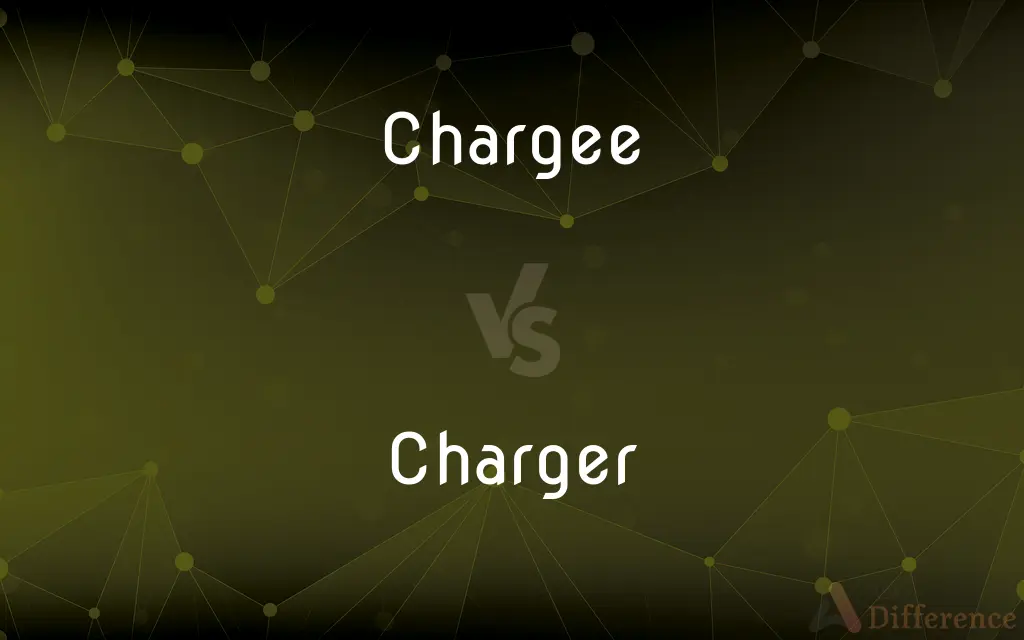Chargee vs. Charger — What's the Difference?
By Urooj Arif & Fiza Rafique — Updated on April 7, 2024
The chargee is the entity receiving a legal interest in property as security for a debt, whereas a charger refers to a device for replenishing battery power.

Difference Between Chargee and Charger
Table of Contents
ADVERTISEMENT
Key Differences
Chargee typically refers to a legal and financial context, involving the granting of a charge over property as security for a debt. Here, the chargee is the beneficiary, usually a lender or creditor, who holds the interest in the charged property until the debt is repaid. On the other hand, a charger is squarely in the realm of electronics, specifically designed to replenish the energy in a rechargeable battery. It's a device that facilitates the flow of electric current into a battery, thus restoring its power.
While the chargee is concerned with the security and assurance of debt repayment, highlighting a protective mechanism in financial transactions, a charger is focused on the practical aspect of keeping electronic devices powered. The chargee's role emerges from a legal agreement, serving to protect the lender's interest in the event of a default. In contrast, the charger serves a technical function, essential for the maintenance of battery life in various electronic gadgets.
The terms also reflect different domains of application; chargee being used in legal, financial, and real estate contexts, where it signifies a form of security interest. Whereas, a charger is commonly discussed in consumer electronics, automotive, and technology sectors, emphasizing its utility in ensuring devices operate effectively.
Furthermore, the relationship between a chargee and the property or borrower is one of legal rights and obligations, shaped by contracts and law. Meanwhile, the relationship between a charger and a battery or device is one of functionality and compatibility, governed by technical specifications and requirements.
The difference in nature between the two terms also extends to their necessity and usage; the role of a chargee is crucial in financial agreements involving large sums, such as mortgages or loans, providing a safety net for lenders. Conversely, chargers are an everyday necessity for individuals and industries reliant on electronic devices, making them ubiquitous and essential for modern living.
ADVERTISEMENT
Comparison Chart
Definition
A legal entity that holds an interest in a property.
A device that supplies electrical energy to a battery.
Context
Legal and financial.
Electronics and technology.
Purpose
To secure a debt through a property interest.
To recharge batteries in electronic devices.
Relationship
Legal rights and obligations with a borrower or property.
Technical and functional compatibility with a device or battery.
Domain of Usage
Financial agreements, real estate.
Consumer electronics, automotive, technology sectors.
Compare with Definitions
Chargee
A legal entity holding an interest in a property as security for a debt.
The bank became the chargee when it granted the mortgage loan.
Charger
A device used to replenish a battery's power.
I need to buy a new charger for my phone; the old one stopped working.
Chargee
The receiver of a legal interest in a property.
The chargee’s interest is recorded in the legal documents.
Charger
Equipment used to maintain battery life in electronics.
Without a charger, the laptop can't be used for long periods.
Chargee
A party in a financial agreement designated to receive repayment.
As the chargee, the financial institution has certain rights over the secured property.
Charger
A power adapter for converting AC to DC power for charging.
The universal charger comes with several adapters for different devices.
Chargee
The beneficiary in a charge agreement.
The chargee has the right to enforce the charge if the debtor defaults.
Charger
An apparatus for supplying electrical energy to a rechargeable battery.
The electric car's charger can fully recharge the battery overnight.
Chargee
A lender or creditor in a secured loan agreement.
The chargee provided the loan under the condition of receiving a charge over the borrower's property.
Charger
A tool essential for the operation of battery-powered devices.
Losing your charger can render your device useless until you find a replacement.
Chargee
One who is charged; the person on whom a charge is levied, who is charged with a crime, who is charged to do something, etc.
Charger
One that charges, such as an instrument that charges or replenishes storage batteries.
Chargee
(legal) The holder or beneficiary of a charge or right in security (such as a debenture).
Charger
A horse trained for battle; a cavalry horse.
Chargee
One who is given charge of caring for another's animal or herd.
Charger
A large shallow dish; a platter.
Charger
A device that charges or recharges.
Put the batteries in the charger overnight so we can use them tomorrow.
Charger
One who charges.
Charger
A large horse trained for battle and used by the cavalry of a lighter build than a destrier.
The knight rode a white charger.
Charger
A large platter.
Charger
A large decorative plate, sometimes used under dinner plates or other savoury-dish vessels in a multi-course meal; also service plate or underplate.
The fancy restaurant used a white porcelain charger when serving.
Charger
(firearms) A speed loader that holds several cartridges together in a single unit for easier loading of a firearm's magazine.
Charger
(prison) A rectal concealment container for prohibited material such as money, drugs and tools.
Charger
Syn of hard charger
Charger
One who, or that which charges.
Charger
An instrument for measuring or inserting a charge.
Charger
A large dish.
Give me here John Baptist's head in a charger.
Charger
A horse for battle or parade.
And furious every charger neighed.
Charger
Formerly a strong horse ridden into battle
Charger
A device for charging or recharging batteries
Common Curiosities
Is the role of a chargee limited to financial transactions?
Yes, the role of a chargee is primarily in the context of securing debts in financial transactions.
Can a charger work with any device?
Chargers typically work with devices they are designed for, although universal chargers can accommodate multiple devices.
What is a chargee?
A chargee is a legal entity that receives an interest in a property as security for a debt.
What does a charger do?
A charger replenishes the power in a battery, enabling the continued use of electronic devices.
How does a chargee secure a debt?
A chargee secures a debt by holding a legal interest in a borrower's property until the debt is repaid.
Can a chargee take possession of the property?
If the debtor defaults, the chargee may take steps to enforce their security interest, including taking possession of the property.
What legal rights does a chargee have?
A chargee has rights as outlined in the charge agreement, including enforcement of the charge in case of default.
What is the significance of a charge agreement to a chargee?
It legally binds the debtor to the chargee, ensuring the chargee's interest in the property as security for the debt.
Can I use a phone charger to charge a laptop?
Generally, no, unless the charger is designed to be compatible with both, as laptops and phones have different power requirements.
What's the importance of a charger in daily life?
Chargers are crucial for keeping electronic devices powered and operational in daily life.
Are all chargers the same?
No, chargers vary in specifications and are designed to match the charging requirements of specific devices.
Why is it recommended to use the manufacturer's charger?
Using the manufacturer's charger ensures compatibility and safety, reducing the risk of damage to the device.
How do I choose the right charger for my device?
Choose a charger compatible with your device's technical specifications for safe and efficient charging.
What happens if a charge is not repaid to a chargee?
The chargee may enforce the charge, potentially leading to the sale of the secured property to recover the debt.
Can a chargee be an individual?
Yes, a chargee can be an individual or a legal entity, such as a bank or financial institution, holding an interest in a property.
Share Your Discovery

Previous Comparison
Win vs. Won
Next Comparison
Squirrel vs. PossumAuthor Spotlight
Written by
Urooj ArifUrooj is a skilled content writer at Ask Difference, known for her exceptional ability to simplify complex topics into engaging and informative content. With a passion for research and a flair for clear, concise writing, she consistently delivers articles that resonate with our diverse audience.
Co-written by
Fiza RafiqueFiza Rafique is a skilled content writer at AskDifference.com, where she meticulously refines and enhances written pieces. Drawing from her vast editorial expertise, Fiza ensures clarity, accuracy, and precision in every article. Passionate about language, she continually seeks to elevate the quality of content for readers worldwide.
















































